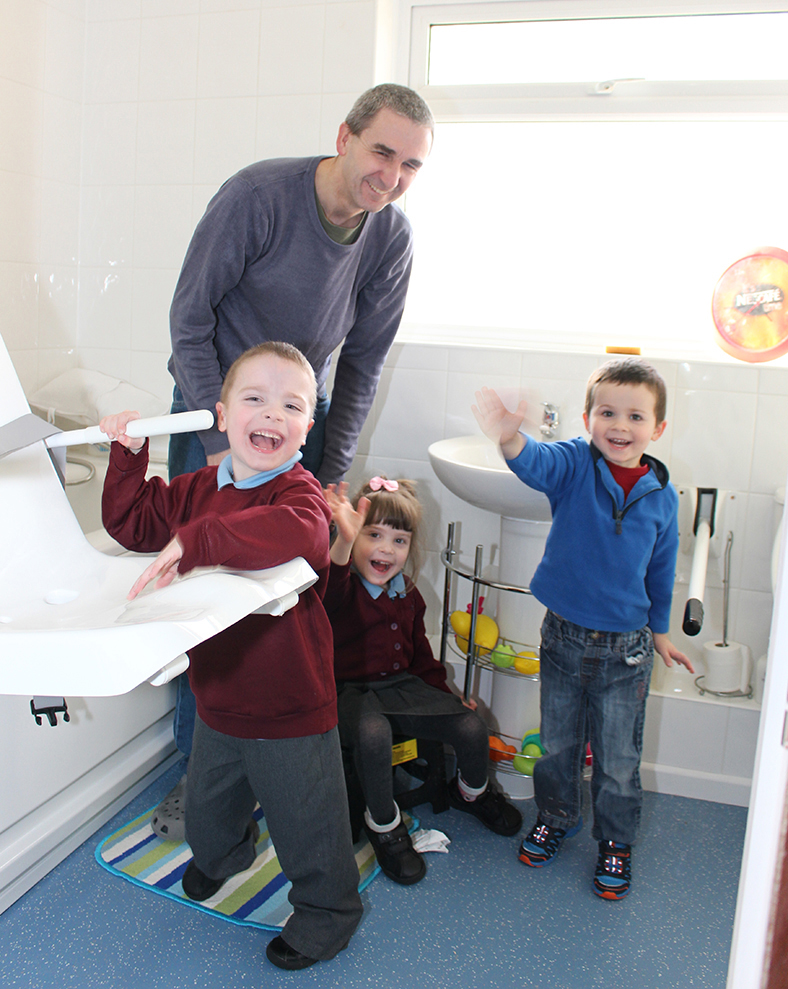The benefits of bathing for children with cerebral palsy
By Louise Sharp, Occupational Therapist
What is cerebral palsy?
Cerebral palsy (CP) is a lifelong condition that affects movement and muscle control which is caused when the brain is starved of oxygen either during pregnancy or birth.

There are several types of CP, it can affect any part of the body in different combinations and creates stiff and jerky movements, increased muscle tone, limited range of movement, involuntary muscle spasms and changes in muscle tone from stiff to floppy. It also affects balance, coordination, and spatial awareness as well as learning difficulties, communication problems, epilepsy and swallowing issues.
The presentation of CP varies from child to child and the severity of the disability can be mild to significant. Some children will be able to walk and talk whilst those more severely affected will be unable to do these things.
The impact of cerebral palsy on bathing
Movement and positioning
As mentioned, CP can affect a child’s movement making bathing difficult because they may not be able to sit unaided or have involuntary movements that means they move out of position quickly or knock themselves on the side of the bath.
A child who cannot sit unaided will either need support from a parent or specialist postural bathing equipment to support them and keep their heads above the water.
Safety
Keeping a child safe in the water is paramount and with unpredictable movements this can be hard to do. Once water and soap are added to the mix, children who are more significantly affected, can become very difficult to handle when they are wet and slippery.
Some children with CP have jerky movements and, in these instances, water may be splashed onto the floor creating a slip hazard for parents.
Taking the parents’ safety into account is also important as bending over a bath to support and wash a child could lead to back problems or musculoskeletal injuries.
How the child is transferred into the bath also needs to be carefully considered to ensure everyone’s safety.
Many people think it is not safe to bathe if you have epilepsy and whilst for some this is appropriate advice, with a robust risk assessment in place, bathing can be achieved for children who have epilepsy and CP.
Understanding
If a child with CP has the associated learning difficulties, they may not have danger awareness and not understand the need to remain above the water in the bath.
They may also have difficulties understanding the purpose of the bath and be unable to process the concept of bathing.
Emotions
For older children with CP who need support with bathing, there may be a level of embarrassment or shame that they are naked in front of their parents, especially as they hit puberty.
Communication is another factor, many children with CP have some limitations with their speech so it may be hard for them to communicate their needs and desires around how they want to bathe.
The benefits of bathing on cerebral palsy
- Reduced muscle stiffness a warm bath encourages circulation of blood, which provides the muscles with more nutrients and oxygen (1)
- Reduced aches and pains when the muscles are more supple, pain is reduced
- Reduced stress and anxiety when the body has less pain, the nervous system relaxes.
- Stretches muscles carrying out daily stretches in the bath will help to make muscles more subtle as it is a low impact environment
- Improves sleep a warm bath can be relaxing before bed and help children who experience pain to settle to sleep quicker
- Provides a routine familiar routine helps children know what is happening next in their day and what is expected of them. Predictability helps children feel safe and in control of their environment.
- Opportunity for play children of all levels of ability can play in the bath, for the more severely affected, bath time is a great opportunity for sensory play and exploration. Play in the bath can help children in all areas of their development from numeracy and literacy to social skills and fine motor skills.
- Opportunity for different positioning many children with CP spend a significant amount of their time in wheelchairs and postural seating. By spending time in the bath, they can experience different movements and positions.
One of the most important benefits of bathing for children with CP is normality! Culturally, children in the UK bathe rather than shower, particularly as part of their bedtime routine so it is very important for children with CP to experience this, as any other child would.
References
- D Knight (2022) 10 health benefits of taking a hot bath. Avaliable at https://www.byrdie.com/benefits-of-hot-baths-4778411

